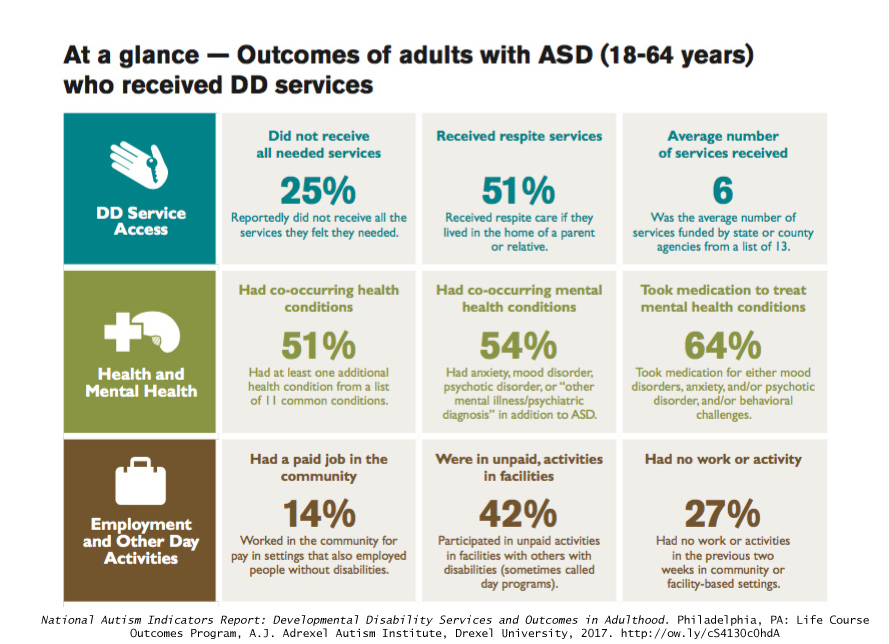WEEK OF
May 29th
U.K. National Health Service commissioners in one part of London are considering restricting autism diagnoses among school-age children to only those with the most significant issues, BBC News reported last week. The commissioners blame an unexpectedly large demand for assessments, but national autism organization leaders are deeply concerned that many children will fall through the cracks. The commissioners say that they’ve made no final decision and no changes are on tap for this year.
A quarter of U.S. adults with autism who rely on state disability services do not work or engage in other daily activities, and only 14 percent have paid employment, according to a large survey by Drexel University in Philadelphia. Another quarter of adults with autism believe they don’t get the full services they need.

The findings add to mounting evidence that young people with autism face a “services cliff” when they age out of school, report author Anne Roux, research scientist at Drexel, said in a statement. For many adults with autism, the support that is available may not be appropriate for their needs.
More than half of the Drexel survey respondents reported having a mental health condition such as anxiety or depression in addition to autism. Studies have previously found high rates of depression among men with autism, and many girls with autism face depression and anxiety as they enter their teens.
Ever since the gene-editing technology known as CRISPR made its global debut, concerns about unintended consequences have shadowed it. Off-target editing was among the hypothetical worries, but it’s hypothetical no longer: A U.S. research team reported in Nature Methods this week that a CRISPR guidance molecule that successfully repairs a blindness-related mutation in mice introduces mutations in unpredicted places. The authors call for careful development of standards to monitor for such wayward activity.
Parents of children with autism frequently turn to supplements and special diets, often at the recommendation of friends, families or practitioners. But none of the most popular nutritional interventions for autism, such as gluten- or casein-free diets, have any effect, according to a review of 19 randomized controlled studies published in the May issue of Pediatrics.
Supplements such as digestive enzymes, levocarnitive and vitamin B12 also failed to meet the effectiveness threshold. The harms of special diets and supplements are “difficult to assess,” the researchers write. But the cost of certain supplements and special foods is worth considering in the absence of evidence that they help.
With the arrival of Ramadan, Minnesota health officials and imams alike are deeply concerned that the gatherings associated with the Muslim holy month will fuel an already intense measles outbreak in the local Somali-American community, The Washington Post reported Thursday. The outbreak stands at 73 confirmed cases as of Thursday.
Minneapolis imam Sharif Mohamed is urging faith leaders to work with health professionals to stem the infectious tide, according to the newspaper. He and other imams in the region are battling the influence of anti-vaccine activists who have targeted this population in recent years. The current vaccination rate in the community is only 42 percent, driven down from 92 percent in 2004 by misinformed fears of a link between vaccines and autism — a link that has been repeatedly debunked.
People with autism have eye conditions at rates similar to those in the general population, although some conditions, such as strabismus (crossed eyes) may occur more commonly with autism. The authors of the work, published in the June issue of the Review Journal of Autism and Developmental Disorders, reviewed seven studies examining visual impairments and autism. They found hints of a two-way association: an autism prevalence of 11.6 percent among people with congenital blindness, far higher than the usual autism prevalence estimates of 1 to 2 percent in the general population.
Vision retesting as any child with autism approaches adolescence is a good idea, the authors say, because some autism-related features may decrease with time and developmental delays may resolve, making testing more accurate.
Making a career move? Send your news to [email protected].
By joining the discussion, you agree to our privacy policy.